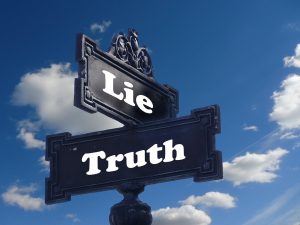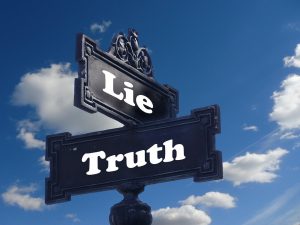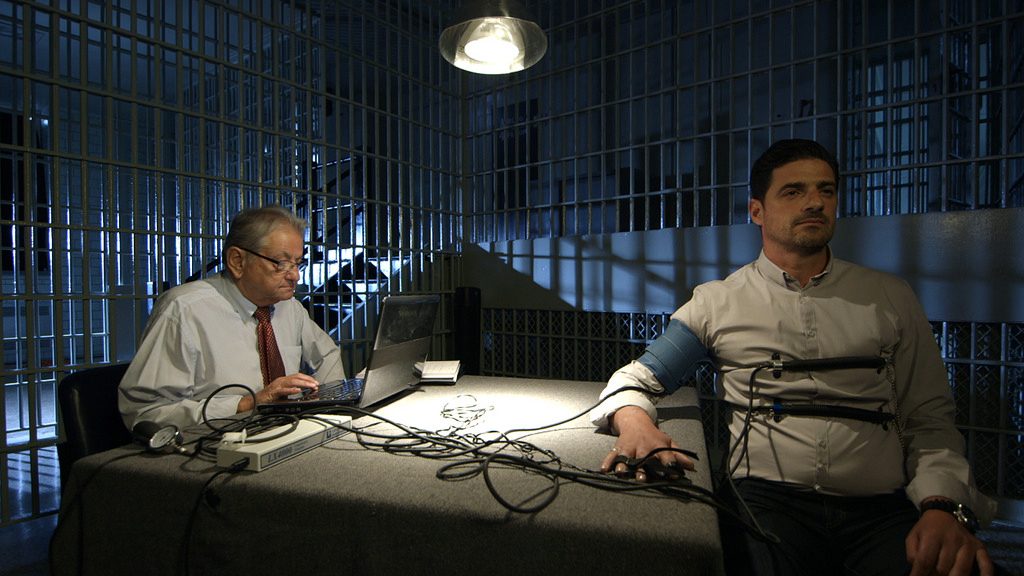I Know You’re Lying: How to Become a Human Lie Detector


Knowing who to trust after SHTF will be difficult which is why learning how to detect lies is such a valuable skill.
Not only can this save you from falling prey to deception, but it can also help you make better decisions on who to partner with during a crisis.
As you’ll read below, many of the widely accepted signs that someone is lying aren’t actually true themselves.
By learning how to really tell if someone is lying to you, you’ll increase your chances of survival and gain a skill that can save you from becoming a victim.
How to Become a Human Lie Detector
Forget What You’ve Heard Before
Getting better at detecting lies starts with forgetting a lot of what you already know about lying tells.
For example, you’ve probably heard someone ask a suspected liar to look them in the eyes before speaking. The idea here is only honest people can maintain direct eye contact whereas a liar will falter if they try to do the same.
In reality, studies have shown that truth tellers will make eye contact only 60% of the time. Not only that, but liars actually tend to make more eye contact during conversations because they want to see if you believe what they’re saying.
Another stereotype is that liars are fidgety and nervous, but again, the opposite is more likely to be true.
Just like prey will sometimes freeze when they sense a predator nearby, liars like to keep their bodies still in order to remain undetected.
Plus, some people are naturally nervous in tense or awkward situations, so that in and of itself is no indicator of whether they’re telling the truth.
But all this doesn’t mean that someone’s eyes can’t give them away as an increased blink rate is often consistent with telling lies. Honest people blink about 6-8 times per minute on average. When someone knows they’re lying, they may blink 6-8 times in rapid succession.
Other Lying Tells
In addition to blinking, here are some other tells to help you detect when someone is lying.
1 – See if their palms are facing up. People who lie tend to speak with their palms facing up as if they were supplicating themselves and asking you to believe them.
2 – Liars will often give elaborate answers to simple questions or repeat questions back to stall for time.
3 – Face touching. There is a chemical reaction that causes people’s faces to itch when they lie.
The Secret Military Method to Find Out if Someone is Lying

Former Green Beret Sergeant Major Karl Erickson developed a simple method he used to sniff out liars while he served in the military.
Step One: Do Some Research
If at all possible, you want to get some background information on the person you’ll be speaking with.
Erickson suggests going to their social media to find some basic information that you know they won’t lie about like where they went to school.
Step Two: Establish a Baseline
The next step involves using the information you gathered in step one to establish the other person’s baseline.
Basically, you want to ask a series of easy questions so that you can observe how the person reacts when they tell the truth.
For example, if you know for a fact that they recently went on vacation, you can ask about that.
Once you’ve got your baseline, it’s time to start asking more serious questions. Again, you want to pay close attention to how the other person reacts to see if there’s any change in their behavior.
Step Three: Repeat Your Questions
Now that you’ve shifted gears in the conversation, you need to try asking the same question multiple times in different ways.
The key here is that you aren’t really looking for slip-ups. What you actually want to see is if the person uses the same phrasing over and over again like it was something they rehearsed.
Similarly, you want to note the speed of their response. If you ask a question and they can immediately provide an answer without thinking, that’s a sign that they’re lying or not revealing the whole story.
Step Four: Have Someone Else in the Room
This method relies heavily on observational skills which is why Erickson suggests having one other person in the room with you who is also observing the suspect.
It’s possible that they can pick up on certain cues you missed.
Use these 7 Magic Words to Weed Out Liars in Your Everyday Life
In the video below, you’ll learn 7 magic words that can help spot liars in everyday life.
How to Lie Effectively
Honesty is a virtue, but ability to lie effectively is a key survival trait for humans in social situations.
When SHTF, your life and the lives of your loved ones may in fact depend on your ability to deceive others and hide the truth.
Here are a few tips to help make sure your lies are believable.
Tell the Truth – One of the best ways to lie is by telling the truth misleadingly.
For example, let’s say disaster strikes and one of your unprepared neighbors asks if you have any food supplies in your house.
Instead of saying yes or no, you can tell the truth and let them know you don’t have any extra food available.
Keep Your Lies Simple – As mentioned, liars tend to be elaborate and offer unnecessary details when they lie to compensate. Keep your lies short, simple, and to the point.
Admit to Something Else – Similar to the first tip, confessing to something else can help throw people off of your tracks.
